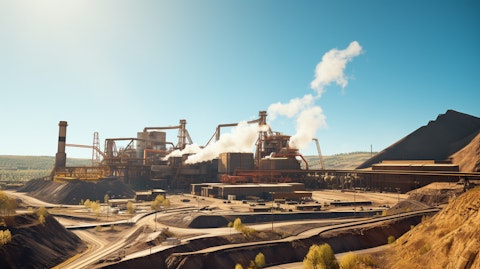CONSOL Energy Inc. (NYSE:CEIX) Q3 2024 Earnings Call Transcript November 5, 2024
CONSOL Energy Inc. beats earnings expectations. Reported EPS is $3.22, expectations were $3.17.
Operator: Good morning, ladies and gentlemen, and welcome to the CEIX Third Quarter 2024 Earnings Conference Call. At this time, all lines are in listen-only mode. Following the presentation, we will conduct a question-and-answer session. [Operator Instructions] This call is being recorded on Tuesday, November 5th of 2024. I would now like to turn the conference over to Nathan Tucker, Director of Finance and Investor Relations. Please go ahead.
Nathan Tucker: Good morning, everyone, and thank you for joining us. Welcome to CONSOL Energy’s third quarter 2024 earnings conference call. Any forward-looking statements or comments we make about future events are subject to risks, certain of which we have outlined in our press release and in our SEC filings and are considered forward-looking statements within the meaning of Section 21E of the Securities Exchange Act of 1934. We do not undertake any obligation of updating any forward-looking statements for future events or otherwise. We will also be discussing certain non-GAAP financial measures, which are defined and reconciled to comparable GAAP financial measures in our 2024 third quarter press release furnished to the SEC on Form 8-K, which is also posted on our website.
Additionally, we filed our 10-Q for the quarter ended September 30, 2024, with the SEC this morning. You can find additional information regarding the company on our website www.consolenergy.com, which also includes the supplemental slide deck that was posted this morning. On the call with me today are Jimmy Brock, our Chairman and Chief Executive Officer; Mitesh Thakkar, President and Chief Financial Officer; and Bob Braithwaite, our Senior Vice President of Marketing and Sales. In his prepared remarks, Jimmy will highlight our third quarter achievements and strong operational results. Mitesh will then provide an update on our coal markets, financial performance, and our most recent liability management initiatives, before providing an update on our 2024 outlook.
In his closing comments, Jimmy will provide an update on the proposed merger with Arch Resources, and add our key priorities for the remainder of the year, as we prepare to head into 2025. There will be a Q&A session following our prepared remarks in which Bob will also participate. With that, let me turn it over to Jimmy.
Jimmy Brock: Thank you, Nate, and good morning, everyone. I am very pleased to report that CONSOL Energy, had a very strong financial and operational performance in the third quarter, despite a planned longwall move and a planned summer maintenance shutdown. As we work to turn the page from the Francis Scott Key bridge collapse, and its effect on our CONSOL Marine Terminal, the PAMC achieved its highest ever third quarter sales and production tonnage level. Additionally, due in part to the strong production volumes, the PAMC achieved its lowest cash cost of coal sold per ton level since the first quarter of 2023. These results are a testament to the resiliency of our operations and desirability of our product. On the operations front, beginning with our safety performance.
Our Bailey Preparation Plant and the Itmann Preparation Plant each had zero employee recordable incidents during the third quarter of 2024. Our coal operations finished the quarter, with a total recordable incident rate well below the national average for underground coal mines. Coal production at the Pennsylvania Mining Complex came in at 7.2 million tons in Q3 ’24, compared to 6.1 million tons in the prior year period. The mines operated well during the quarter, and completed the planned longwall move for a timely, safely and efficiently, which contributed to the strong production performance compared to Q3, ’23. Our PAMC average cash cost of coal sold per ton for Q3, ’24 was $35.85, compared to $38.36 in Q3, ’23, mainly due to improved production tonnage as well as reduced contractor, and purchased servicing costs.
We finished our last planned longwall move of 2024 in the third quarter for PAMC. Moving on to the Itmann Mining Complex. During the third quarter of 2024, sales from the complex, including third-party tons were 152,000 tons, compared to 164,000 tons in Q2 ’24. This slight impairment was due to ongoing equipment delivery delays with a major supplier, and adverse geological conditions, both of which limited our production in the quarter. We continue to deal with abnormally long lead times on both new, and rebuilt section equipment during Q3, ’24. However, the first of four miners was received in October, and we currently expect the remaining three to be delivered shortly, possibly by the end of this year. These continuous miner units, are expected to increase the overall productivity of the mine.
While we waited for these machines, the Itmann mine operated two of its three continuous miner section, as super sections during the third quarter of 2024. And despite being limited in the number of sections we could run, long-term mines development progressed. Toward the end of September, the Itmann Mine began retreat mining, which we expect will improve our efficiency and productivity. Furthermore, at the end of October, a deep cut plan was approved by MSHA for two of the three continuous miner sections, which will also improve the overall efficiency of the mine. Moving to the CONSOL Marine Terminal. Rebounding from the Francis Scott Key bridge collapse that limited our export capacity for much of the second quarter, the CMT shipped 4.7 million tons during the third quarter of 2024, compared to 4.3 million tons in the prior year quarter.
For Q3, ’24, terminal revenues came in at $23.7 million, and CMT operating cash costs were $6.9 million. Accordingly, CMT adjusted EBITDA finished at $15.9 million, compared to $14.9 million in the prior year period. With that, let me turn the call over to Mitesh, to provide the marketing and financial updates.
Mitesh Thakkar: Thank you, Jimmy, and good morning, everyone. Let me start with an update on the marketing front and our contracting progress. During 3Q, ’24, we sold 6.8 million tons of PAMC coal at an average coal revenue per ton sold of $64.28, compared to 6.1 million ton at $70.34 in the year ago period. In the domestic market, low natural gas prices and an inventory overhang from warm winter weather, have weighed on the ability of power plants, to consume and procure additional coal throughout much of 2024. However, more recently, PJM West day ahead power prices increased more than 20% in the third quarter, compared to 2Q, ’24. According to EVA, Northern Appalachian coal burn increased by approximately 30% over the same time period.
Looking ahead, there are signs of further optimism. Domestic power demand growth is expected to accelerate, due to data center build-outs and EV growth. This has led to additional potential delays in coal plant retirements. Duke Energy Indiana recently announced, a plan to delay the retirement of multiple units by several years to 2038. This is a positive development, indicating a changing sentiment towards baseload power in the U.S. In September, McKinsey & Company increased its forecast for U.S. data center energy consumption in 2030 by 50%, compared to its forecast from just a year ago. With this backdrop, we have been able to layer in several multiyear contracts in the domestic market during the course of this year. On the international front, throughout the third quarter, which is typically the shorter season, API2 prices remained resilient and average approximately $115 per metric ton.
European coal demand has recently picked back up and buyers are securing cargoes ahead of the winter. Moving to Asia. Indian demand for Napco has softened due to prolonged monsoon season, and lower pet coke prices. However, demand for our crossover metallurgical product has been robust this year, particularly in China and Southeast Asia, and due to the optionality of our PAMC product, we elected to move more tons into this market during the third quarter. We shipped a total of 1.1 million tons into the crossover met market during 3Q, ’24, which was by far our highest ever quarterly level into that market. Our product blends very well with high-quality coking coals out of Australia, and the lifting of the ban on these coals into China has helped us significantly increase sales into this market.

This quarter once again highlighted the strategic value of our high-quality product with the optionality to serve many different end-use markets, and our ability to quickly pivot among them. Looking ahead internationally, we continue to see an improving outlook for coal demand. For instance, the International Energy Agency recently published its annual World Energy Outlook. Within this report, the IEA has issued an upward revision to its projected coal consumption in 2030 by 6%, compared to its report from last year. Moving on to the contracting front. We remain near fully contracted in 2024 based on the midpoint of our production guidance. Throughout 3Q, ’24, we elected to take a prudent and patient approach when adding to a contracting book, due to the recent weakness in pet coke prices, and the prolonged monsoon season in India, which have caused many of our industrial customers, to become more short-term focused.
However, demand has remained strong in our industrial markets, and we expect to increase our book further as we close out the year. During 3Q, ’24, we increased our contracted position to approximately 18 million tons in 2025. Now let me provide a quick recap of our financial results, before providing an update on our insurance claim, and some exciting news on continued liability management efforts. This morning, we reported impressive third quarter 2024 operational and financial performances. We achieved net income of $96 million, or $3.22 per diluted share and adjusted EBITDA of $179 million. Accordingly, we generated $122 million of free cash flow, which was higher than the free cash flow generated in the first half of 2024. During 3Q, ’24, we made debt repayments of $2 million, spent $39 million in capital expenditures and paid a dividend totaling $7 million, to our shareholders.
Consistent with the capital return framework outlined in the merger agreement with Arch Resources, we announced a $0.25 per share dividend, which will be payable on November 26, 2024. Due to the temporary closure of the Port of Baltimore in 2Q, ’24, our second quarter results were significantly impacted. And as such, we have been hard at work with our insurance adjusters, to calculate a potential business interruption claim related to the incident. As of mid-October, we submitted a formal claim, and we hope to reach final settlement by the end of 2024. Now let’s move on to our most recent liability management initiatives. In early October, we finalized agreements with the Pennsylvania DEP to establish a Global Water Treatment Trust Fund. As what we believe to be an industry first, in terms of scope and magnitude, the funnel will provide an alternative financial assurance mechanism for all our legacy perpetual water treatment liabilities located in Pennsylvania, which consists of 22 total facilities, or approximately two-thirds of the legacy mining operations managed by CONSOL.
The water treatment establishes a long-term mechanism to pay for these liabilities over time and in turn, will reduce our exposure to surety bonds and collateral requirements. The PA facilities account for approximately 83% of all surety bonds tied to our legacy environmental liabilities, and approximately 40% of our legacy related asset retirement obligations. We have agreed to a minimum $2 million annual contribution until the fund reaches $74 million based on initial valuation, including earnings. As the cash value of the fund grows over time, surety bonds will be reduced and released by the PADEP. For comparison, our PA water treatment surety bond footprint is approximately $120 million, and will eventually be all released. As part of the agreement, CEIX has agreed to make an initial contribution into the fund of approximately $12 million.
$2 million of which was paid in October with the balance due within 90 days of close, subject to certain bonds being released by the PADEP. This initial contribution will fully fund 12 of the 22 facilities, and result in a total surety bond reduction of approximately $58 million in aggregate. This voluntary effort puts a proactive legacy liability management approach into action, and underscores our commitment to environmental stewardship. Now let me provide a quick update on our outlook for 2024. On the pricing front, given our strong performance at the PAMC in 3Q, ’24, we are tightening the range and increasing the midpoint of our PAMC average coal revenue per ton sold to an updated range of $64.50 to $66. On the cost front, due to the improved operational performance in 3Q ’24, we lowered the top end of our PAMC average cash cost of coal sold per ton guidance, by $1 per ton to a range of $37.50 to $38.50.
Additionally, we are moving up the bottom end of our PAMC sales volume guidance range by 0.5 million tons to an updated range of 25 million to 26 million tons, reflecting a strong 3Q, ’24 operational performance. For our Itmann Mining Complex, we are lowering our sales volume guidance range by 100,000 tons to a range of 600,000 to 800,000 tons, due to the slower-than-anticipated operational ramp-up at the complex. We remain optimistic about our ability to achieve the full ramp-up once the remaining section equipment arrives, and we are encouraged by the commencement of retreat mining, and the approval of the deep cut plan for multiple sections in the mine. Lastly, on the capital expenditures front, we are maintaining our previous range. With that, let me turn it back to Jimmy.
Jimmy Brock: Thank you, Mitesh. Let me now provide an update on the proposed merger with Arch Resources. Both teams continue to work very hard towards achieving approval. The waiting period under the Hart-Scott-Rodino Act expired on October 11, and we also obtained final clearance of the proposed merger from Brazil, Poland and China, with the last required approval received in October, satisfying all antitrust regulatory closing conditions for the transaction. With respect to the SEC review, the Form S-4 was filed on October 1, and Arch Resources are working toward obtaining shareholder approval for the proposed merger. We still anticipate closing to occur by the end of Q1 ’25. For the remainder of 2024, we will be focused on a few key areas that we believe will set us up for success moving forward.
First and foremost, we are very excited about the proposed merger with Arch Resources, and are looking forward to the potential formation of Core Natural Resources. We believe these two companies would be stronger together and could achieve more, as one entity than either could standalone. Our major priorities are obtaining shareholder approval, developing a road map geared toward executing a timely transition, and realizing for synergy value as quickly as possible. There is no doubt that a lot of coordination and effort, will be required on both sides. But I have full confidence that these two teams can come together seamlessly, and be ready to hit the ground running on day one. Second, we will continue to focus on running our operations, as safely and efficiently as possible.
The operations ran very smoothly during the third quarter, and we are set up to run well in the fourth quarter, given the longwall moves. Third, despite a longwall move in the third quarter, we achieved a reduced cash cost of coal sold per tonight, compared to multiple prior quarters. We will continue to focus our efforts on managing our spending levels, and reducing the impact of the inflationary pressures, we faced over the past several years. Finally, we are prioritizing to filling out our sales book in 2025 and beyond. We are taking a patient approach, particularly in the export industrial market, as low pet coke prices are contrasted against durable API2 prices. However, many believe pet coke prices are at or near the floor. The benefit of our product is at its ability to sell into many different end-use markets, which allows us to play the art.
This year is a great example where our product is highly desired in the crossover met market. As of October 31, our year-to-date 2024 crossover sales have already surpassed our highest annual sales tonnage level into that market in our history. As I often do, let me finish by recognizing our employees. This quarter was again a testament to their hard work and dedication. Despite the curveball thrown at us with the bridge collapse in the Port of Baltimore, the team hit the ground running in the third quarter with strong operational performances on multiple fronts. The CONSOL team in tandem with the Arch Resource team, continues to work diligently toward a successful and timely closing of the proposed merger and developing a smooth transition plan for Core Natural Resources.
I am very grateful for their hard work, and extremely excited to formally combine two great teams in the coming months. With that, I will hand the call back over to Nate for final instructions.
Nathan Tucker: Thank you, Jimmy. We will now move to the Q&A session of our call. At this time, I’d like to ask our operator, to please provide the instructions to our callers.
Operator: Thank you. [Operator Instructions] Our first question comes from the line of Lucas Pipes from B. Riley Securities. Please go ahead.
Q&A Session
Follow Core Natural Resources Inc. (NYSE:CNR)
Follow Core Natural Resources Inc. (NYSE:CNR)
Receive real-time insider trading and news alerts
Lucas Pipes: Thank you very much, operator. Good morning, everyone. My first question is on the contract book for 2025, and apologies if I missed that. But could you provide a breakdown of the 18 million tons in terms of market exposure? And then also kind of average price, as of today with the indices stand. And then for the uncontracted tons, what markets are you targeting? And then lastly, on the commercial side, could you speak a little bit to, domestic contracting? How many years out are utilities looking for coal? And what sort of prices are you able to lock in on that front? Thank you very much.
Bob Braithwaite: Sure. It’s Bob, Lucas. As we mentioned, we’re about 18 million tons contracted for 2025. That’s an improvement of about 3.5 million tons since last quarter. About 900,000 tons of that was domestic contracts. I will tell you that we’ve been successful in securing prices, I’ll tell you that are at or above what the published marks that are out there today. I believe those markets are in the low to mid-50s. So we have been successful in concluding deals above those marks. The balance for 2.6 million tons into the export market, I will tell you, it’s been a mixture of some into India, but mainly into the crossover market into China. This year, China has been a bright spot for us, as Mitesh mentioned on the call, we’ll probably move somewhere in the neighborhood of 2.5 million to 3.5 million tons into China all told this year.
So we expect that to continue as well into next year. So right now, for the breakdown of ’25, we have 2.5 million tons linked to power indices, 7.8 million domestic. All those would be under a fixed price arrangement, and 7.7 million are into the export market, of which 5.1 million are indexed. I will tell you, they also have ceilings and floors on all those – on all 5.1 million. And sitting here today, based on $115 API2 price what we’re modeling in for next year, again we’re looking at our average price at 18 million tons, roughly in the low 60s. In terms of the additional volume for next year to close out our book, we still see potential to sell more crossover coal not only into Asia, but also into Brazil. And then we’re also seeing pet coke prices come off the floor right now.
We’ve seen as low as $50 FOB Gulf prices, which I think today, they’re closer to $53, $54 and we’re expecting those to continue to increase as Diwali festivals, and monsoon season subsides and construction activities resume in India. So balance of the volume left to sell, I’d say most of that will go into the export market. But we’re also seeing some domestic opportunities as well. And when you ask about the domestic opportunities, long-term, we are seeing customers go out as far as 2028, and we are in negotiations today for volumes.
Lucas Pipes: Thought that was a very comprehensive answer. Thank you for all that detail. My second question is on the cost side. A number of your peers are noting cost disinflation, surely some sales sensitive drivers behind that among operational changes. But could you speak to what you’re seeing on the cost side? To what extent might you be able to participate in some of the disinflation that, we’ve witnessed this earnings season so far?
Jimmy Brock: Well, I think when you look at cost, there’s a lot of variables. For us, we are starting to see some of the – some deflation actually in some of the consumables that we use to mine with, but it’s something that we keep a constant watch on and try to look for ways to improve it. Obviously, for us, this quarter, a big part of our cost was the production tonnage that we mine. That always helps the floor. And then secondly, we continue to work on procurement powers, as we can with all of our suppliers.
Lucas Pipes: Okay, I really appreciate all the color. Jimmy and team, keep up the great work. Thank you.
Jimmy Brock: Thanks, Lucas.
Operator: Our next question comes from the line of Nathan Martin from Benchmark Company. Please go ahead.
Nathan Martin: Thanks, operator. Good morning, everyone.
Jimmy Brock: Good morning, Nate.
Nathan Martin: Maybe quickly to start on the insurance claim due to the Key Bridge collapse. You guys noted hoping to reach a final settlement there by the end of the year. Can we get some more thoughts on that? How much do you project the ultimate settlement could be for?
Mitesh Thakkar: So Nate, as you can imagine, our team has been putting together a lot of information for our insurance companies and present a claim. We did submit a claim of about $60-plus million for the business interruption associated with the Francis Scott Key bridge collapse. I don’t want to speculate on the final recovery and stuff like that. We expect that number to hold, and we’ll see where it goes from there.
Nathan Martin: Okay, Mitesh. Thank you for that. Maybe shifting over to the remainder of this year. First of all, with the new price per ton guidance, what API2 price does that assume now?
Bob Braithwaite: We’re assuming $115. And to be honest, Nate, there’s – the sensitivity is very low. I’d say for every dollar, you’re looking at $0.03 to $0.04 across the entire portfolio. But for Q4, we’re assuming $115.
Nathan Martin: Okay. Bob, I appreciate that. And then maybe just looking at year-to-date production, I think production kind of outpaced sales by about 600,000 tons or so, if my math is correct. I’m assuming some of that is just a lag. But looking at the levels so far, notwithstanding that fourth quarter does have some vacation periods, what would it take to kind of get you maybe towards the higher end of your full year guidance range? Is that feasible?
Bob Braithwaite: Yes. I mean the inventory build, as you know, we don’t have really inventory on site. Most of that inventory was at the terminal or in route to the terminal. I will say that our transportation partners have been doing a really good job for us in terms of getting our product moved to Baltimore. A lot of that inventory is already gone sitting here today. So it’s simply just a timing of when vessels come and when trains arrive. And again, if you look at what we did just in the third quarter alone, CONSOL moved over 4.2 million tons into the export market. We expect to do probably that, if not higher in Q4 as well. So again, it’s just a timing thing, and I would expect that inventory to really reduce here in the fourth quarter.
Jimmy Brock: And Nate, on the production end of it, as we said on the call, we don’t have any longwall moves during the fourth quarter. However, we do have a planned shutdown for the holidays, some of Thanksgiving and that week of Christmas. But it depends same as always, it’s how the trains move and how well we can produce at the mine. But we don’t see anything in our way in Q4. We’ll see how that goes. You could always have unexpected geology, but we run to the market and run as best we can.
Nathan Martin: Appreciate those thoughts, guys. All very helpful. I think I’ll just leave it there. Best of luck in the fourth quarter.
Jimmy Brock: Thank you, Nate.
Operator: [Operator Instructions] Our next question comes from the line of Michael Dudas from Vertical Research. Please go ahead.
Michael Dudas: Good morning, gentlemen.
Jimmy Brock: Good morning, Mike.
Michael Dudas: A couple of things. First, terrific production numbers Q3. Maybe remind us of what the capacity of the three operations, and assuming longwall moves and holes, et cetera. When things are running really well and the market is really good. What can you – what is the capacity achievement ratability for MSHA [ph] complex as you move forward in the next couple of years?
Jimmy Brock: Yes. Well, we used 26 million tons as our base. But when you’re looking at capacity, if everything goes well, as it did in Q3, 28.5 million is what we’ve publicly stated as capacity for the Pennsylvania Mining Complex.
Mitesh Thakkar: And Mike, if you look at 2018 and 2019, we have demonstrated we can produce over 27 million tons during those two years when the market was very supportive.
Michael Dudas: Excellent. I appreciate that. Secondly, maybe for Bob, I know it’s a little tough to decipher, but maybe looking to your customers in India or in Asia, separating out the weather issues and holidays and such, do you get the sense at least for people thinking about later this year into next year, pace of demand, economic activity? Are you anticipating a much stronger market, assuming coal prices normalize as you move forward as you’re looking to get that mix set up for the rest of 2025?
Bob Braithwaite: Mike, and I’ll tell you, there’s certainly not a lack of demand. It’s just right now, it’s hard to come to terms on how to price the coal. When you look at what we did a couple of years ago, we priced a lot of coal against API2. That mechanism doesn’t work per se for coal into India today. So the demand is there, and I think it’s going to remain. It’s just the volatility in the markets is what’s causing us to kind of be patient right now in terms of locking in the balance of the volume. So I feel very confident in our ability to, again, ship and sell our base production level of 26 million tons. It’s just it might be more on a spot basis if we can’t come to terms on how to price it.
Michael Dudas: Understood. Do you think API2 pricing just feel generally some pretty stagnant or kind of flat as it, you know, what could make it break one way or the other?
Bob Braithwaite: I mean I think winter weather certainly is going to be a determining factor there. I will also tell you that we’ve contracted over 400,000 tons last quarter into Europe. So it’s – we’re starting to see certainly some desire. Inventories are low. I think there’s still is concerned about natural – or LNG supply into Europe as well. And I think if they do experience just a normal winter, you’ll see a resurgence in demand, and you’ll see them come back to the market for U.S. coals.
Michael Dudas: Great. And finally, maybe – it’s been an exciting or at least wonders time for electricity generation expectations in the U.S. and with the numbers that PAGM put out a few months go into capacity cost, et cetera. Maybe share how your customers are kind of processing all this as they’re moving over the next several years and it’s just such an order demand for hyperscale AI and 24/7 uninterruptable power and how that could impact your customer base that you’ve been dealing with for decades and such? And how that may firm up maybe in the future maybe not?
Jimmy Brock: Yes, I’ll start, Mike. So I think you hit on it. I mean it’s — the demand for electricity growth continues to grow and people are seeing more and how they’re going to get it is what’s becoming questionable. So I think you’ve seen a lot of these coal-fired utilities who have announced delaying their retirements and some are now not even giving a date. So there is a concern of where they’re going to get it. And I’ve seen some reports that – they think the reliability of the grid is kind of stable now. But keep in mind, most of that reliability, if you look at the graph, is coming from intermittent sources, primarily wind and solar. So I believe people are starting to get concerned about the reliability of the grid.
Hence, that’s why we’re seeing some of these contractual things that Bobby has been able to do extend out to year 2028. So that demand continues to grow. And if it even grows at half the pace that everyone is expecting, then I think you’ll see these coal-fired plants run at least at a higher capacity and may even extend their retirements even further.
Mitesh Thakkar: And Mike, just to put things in perspective, this is not just a long-term thing. Things are happening in shorter term as well. There was an analysis by SNL. If you look at 2025 to 2027, I think the amount of coal plants that we’re supposed to retire when the analysis was done in late 2023 was around 34 gigawatts. And now that number stands at around 29 and change, so it’s about 13% lower between ’25 and ’27 forecast.
Michael Dudas: Quite encouraging. Thanks for your thoughts, gentlemen.
Jimmy Brock: Thanks Mike.
Operator: And no question at this time. Mr. Tucker, please go ahead.
Nathan Tucker: Thank you. We’d like to thank you all for your participation this morning and for your support of CONSOL Energy. We hope we answered your questions, and we look forward to seeing you on our next call. Thank you.
Jimmy Brock: Thanks, everyone.
Operator: This concludes today’s conference call. You may now disconnect. Thank you, everyone.
Follow Core Natural Resources Inc. (NYSE:CNR)
Follow Core Natural Resources Inc. (NYSE:CNR)
Receive real-time insider trading and news alerts





